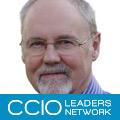Enter the CCG
- 11 December 2013

As it’s the festive season, I thought I’d collect some of the IT principles that I’ve come across recently and present them to the readers of this column as a festive gift.
I try to put them into practice consistently – and they certainly work! However, I should say up front that most of them are other people’s ideas, not my own.
Data
Have a single place to store data. This means only one place to store it, one place to look it up, and one place to amend it. That way you can’t get duplicates, which inevitably get out of sync.
Similarly, use links to information rather than copies of it (especially in emails). This prevents static copies being produced that get more and more out of date and therefore increasingly less reliable.
Don’t forget the first three laws of computing:
1. Take backups
2. Take backups
3. Take backups.
Which leads on to Schofield’s second law of computing: data doesn’t really exist unless you have at least two copies of it. (This doesn’t break the principle of ‘a single place to store data’, because Schofield’s second law is about storage rather than active data.)
Jack Schofield, the Guardian’s long-term computing correspondent and columnist, produced two other rules that are worth bearing in mind.
His first law is ‘Never put data into a program unless you can see exactly how to get it out’. His third is: ‘The easier it is for you to access your data, the easier it is for someone else to access your data’.
System design
Computers make great slaves — and lousy masters. Good system design reflects the processes of the user: clinical behaviour should never have to be forced to fit the IT.
If you are computerising your unit, and you need to send someone to the software house to help with the software design, choose the person who knows most about the workings of your unit, not the person in your unit who knows most about IT.
Remember the 80:20 rule (Pareto’s law): 80% of the outcome can be attained with 20% of the resources. Or, quick development of most of the desired features can often be achieved by relatively minimal proportional outlay.
The obverse is: don’t wait until the software is utterly complete before releasing it – you’ll never get it out of the door.
Then there’s Augustine’s mantra: software is like entropy. It weighs nothing, it’s hard to understand, and it always increases.
Programming
Here are some principles from Eric Raymond’s book ‘The Cathedral and the Bazaar’, modified by Tim Benson:
- If you treat your beta-testers as if they’re your most valuable resource, they will respond by becoming your most valuable resource.
- Perfection in design is achieved not on whether there is nothing more to add, much rather when there is nothing more to take away.
- Often the most striking and innovative solutions come from realising that your concept of the problem was wrong.
- Good programmers know what to write – great ones know what to re-write (and reuse).
The medical use of data
Van der Lei’s first law of health informatics is: ‘Don’t use data for a different purpose than for which it was collected.’
Think of the Quality and Outcomes Framework for GPs. Its scores accurately reward practices financially for the work they do: but some of its indicators aren’t applicable to all practices because they depend upon the clinical makeup of the patient population. Therefore, ranking practices by their QOF score isn’t valid because it doesn’t have a level playing field.
Before using a proxy/surrogate measurement, establish carefully how closely it mirrors what you are actually trying to measure — and if in doubt, don’t use it.
Information can never be expressed to a higher level of accuracy than the data upon which it is based. In addition, if you can’t measure something accurately it is better not to measure it at all: your inferences will only be spurious.
Make sure that any questionnaires you issue are impossible to misunderstand; that the sampling isn’t biased (the biggest problem of the lot in this area); and that you always supply the respondent with boxes to indicate ‘other answer’ (together with a free-text box), ‘don’t know’, ‘not applicable’ and ‘don’t care’.
The use of data in the NHS
The NHS is awash with data, but has very little information.
NHS institutions:
- should not judge individuals or organisations using metrics over which those people or organisations have little or no control
- should not introduce any metric to rank practices and/or clinicians without full exception coding
- should only use metrics for ranking practices and/or clinicians where the metrics are suitable for, or have been designed for, that purpose
- should only set targets and make comparisons on a truly like-for-like basis.
- Equally, they should not:
- ask for year on year improvement. Once a sensible upper target has been reached, high quality should be acknowledged and further improvement should not be demanded. Beyond this level it should be enough to have plans ‘to continue at the present high standard’.
And finally…
There are 10 types of people in this world: those who understand binary, and those who don’t.
Season’s Greetings!


Dr John Lockley
Dr John Lockley is clinical lead for informatics at Bedfordshire Clinical Commissioning Group and a part-time GP.




